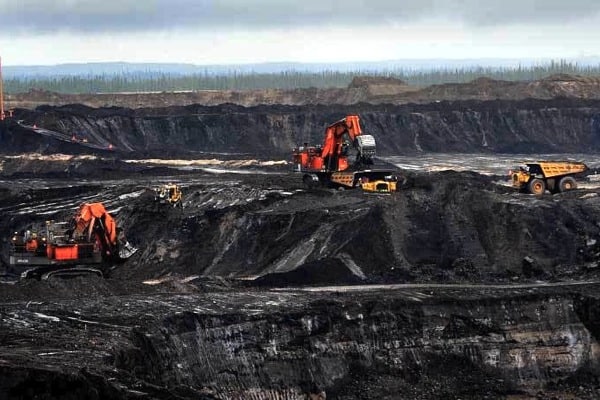

Times are tough for the oil sands sector. With prices stuck at unmanageably low levels for the foreseeable future, other petro sources like the Middle East and even US shale are appearing not just as the cheaper option but the “greener” choice by comparison, or, at least, the less environmentally catastrophic one.
Is it time for a rebranding effort on behalf of Canada’s oil sands, one that promotes the environmental benefits of bitumen-based crude?
CBC News commentator Don Pittis recently took up the torch, saying that the greening of the oil sands could be good not only for business but for the environment. Pittis argues that the key would be in setting up an independent arbiter with criteria and standards to determine what would count as sustainably sound oil extraction.
“Those criteria would have to be hammered out between the industry and environmental groups with reliable green credentials,” says Pittis. “Like diamonds and like fisheries supervised by the Marine Stewardship Council, Canadian oil producers would have to open their facilities to independent inspectors who would set transparent criteria to indicate their greenness.”
Sound like a plan? Aside from the fact that such eco-ratings systems for energy companies already exist — like Equitable Origin’s EO100 Standard, which issues independent certification based on a company’s social and environmental impacts — the idea of environmentally whitewashing (the term is greenwashing) the oil sands is now more of a pipe dream than ever.
Greenwashing, which applies to any attempts to convince the public that a company’s products have environmental credentials when they actually do not, has been practiced by the oil industry for decades. In the mid-1980s, Chevron launched an ad campaign called People Do, where Chevron and its employees were painted as saviours of nature, protecting grizzly bears and butterflies and so on. In fact, the company was panned by environmentalists for bragging about following established, industry-wide environmental laws and for contributing paltry amounts to preservation programs.
Canada’s oil sands has its own greenwashing history, starting with the successful campaign to have its name changed from tar sands to oil sands. But generally, those efforts haven’t paid off, mostly because people — the public, other governments and corporations — have become too well-versed in how tar sands extraction works to be fooled. More than ever, they get that the global economy is on a path towards less and less dependence on fossil fuels and that Canada’s oil sands are manifestly out of step with the trend.
Nevertheless, in the aid of thoroughness, we at Cantech Letter have taken it upon ourselves to speak with a few Canadian environmental organizations to float the idea of setting up a green standard for the oil sands.
You can guess the results.
“It’s a tough hill to climb to convince the public that somehow your industry is green when the facts and visuals say otherwise,” says Dale Marshall, National Program Manager for Environmental Defence. “I think the industry has put a lot of effort into [greenwashing] but it hasn’t changed public opinion about the impact of the tar sands both on the local environment and on climate change.”
“The facts are out there that emissions from the tar sands are higher than most other forms of oil,” says Marshall. “And the images that come from the tar sands region are pretty stark.”
Keith Stewart, Senior Energy Strategist with Greenpeace Canada, adds that for the oil sands industry, the stakes involved in their greening efforts are high, since it’s not just about establishing a reputation but about getting market access.
“Under the previous Conservative government,” says Stewart, “you actually had a coordinated campaign between the Harper government and the Canadian Association of Petroleum Producers to try and promote the tar sands here in Canada and abroad and to defeat environmental legislation in Europe and in the US which would have put limits on high-carbon oil.”
Stewart says that, in reality, the government and industry don’t actually believe their own rhetoric. “If you look at, say, the emissions intensities per barrel, which are actually going up, or, say, Suncor’s sustainability report released a couple of weeks ago, which says that their sustainability has not only been getting worse but it will continue to get worse in terms of greenhouse gas emissions per barrel … the data shows it’s a losing battle,” says Stewart.
What about the idea of an independent set of environmental standards for the oil industry? In truth, comparing among different sources for oil is fast becoming a moot point, as economies are going to keep transitioning away from fossil fuels and towards renewable energy sources like wind and solar. Thus, it won’t matter which oil source you’re looking at, on the sustainability file, they all pale in comparison with renewables.
Greening the oil sands? That’s already a lost cause and no one’s buying it.
Leave a Reply
You must be logged in to post a comment.




 Share
Share Tweet
Tweet Share
Share




Comment